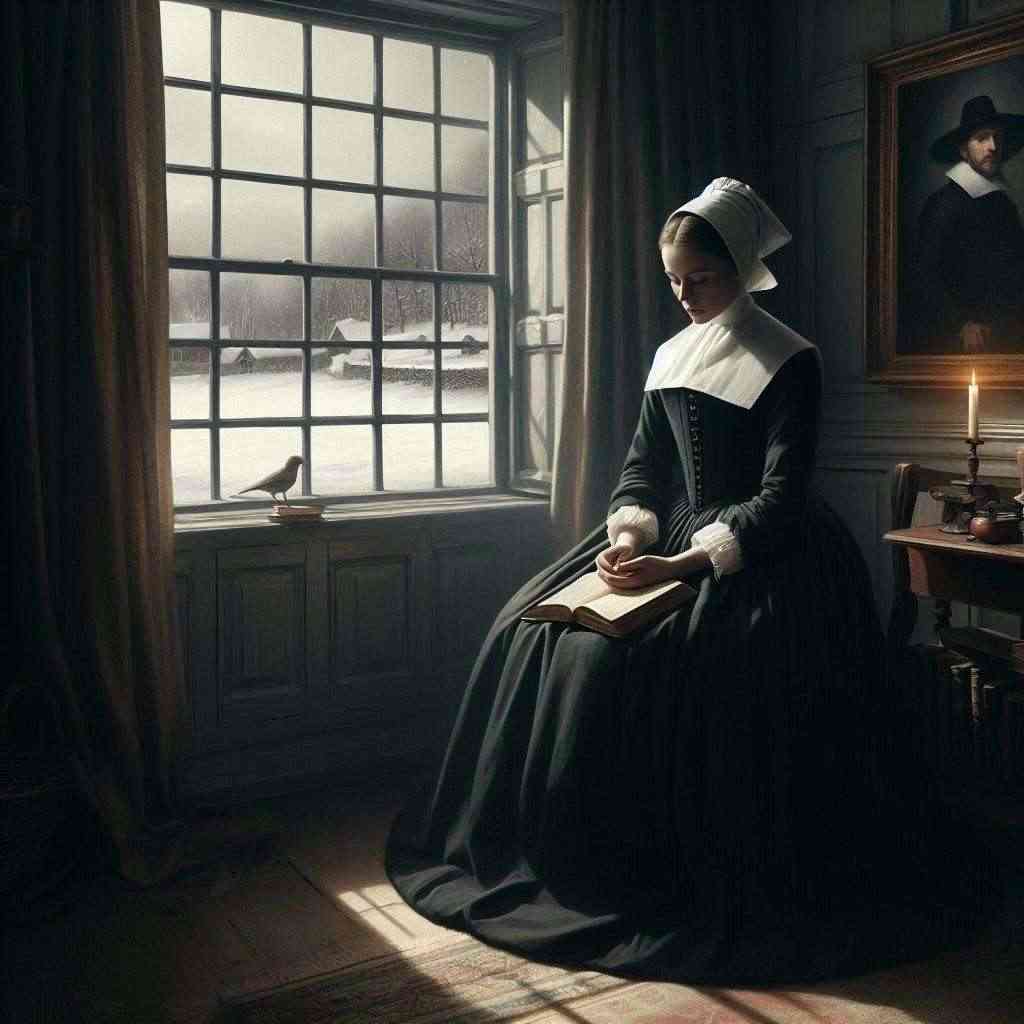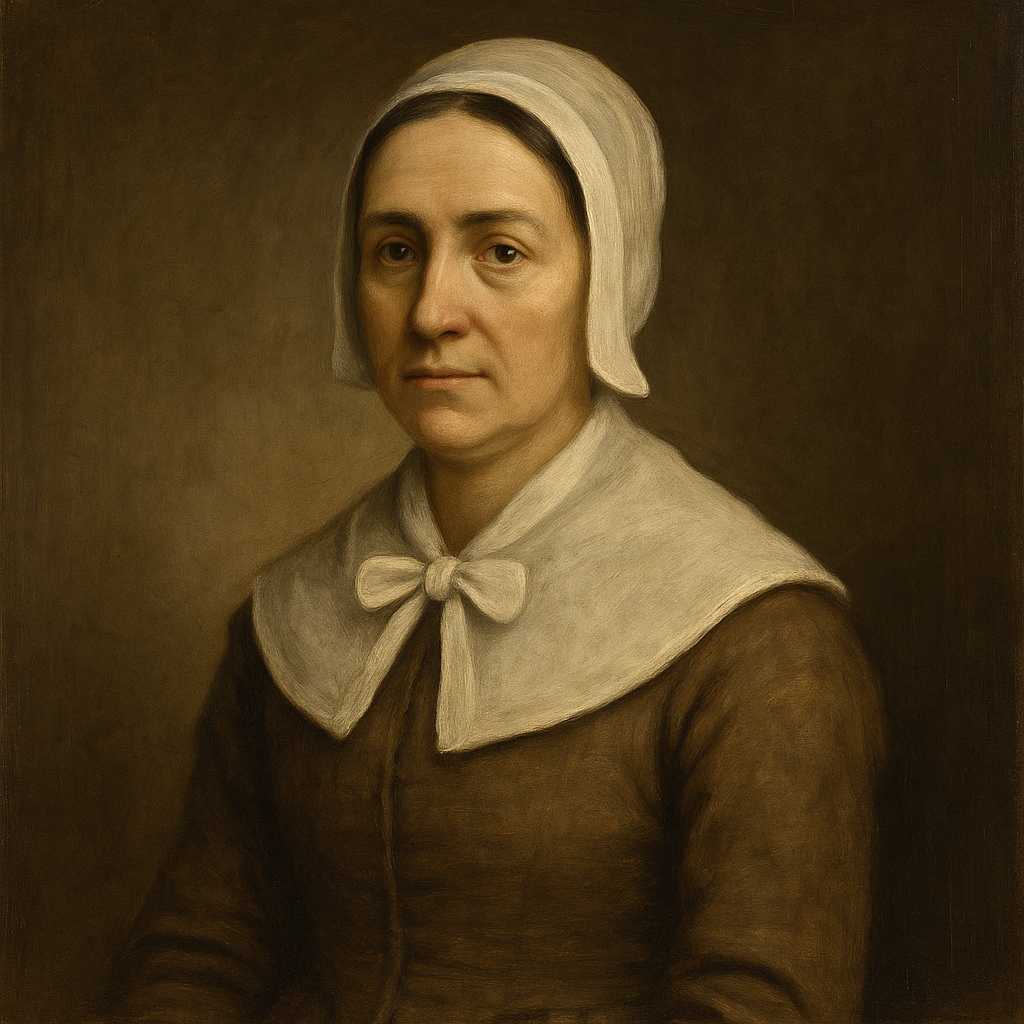A Letter to her Husband, absent upon Publick employment
Anne Bradstreet
1612 to 1672

My head, my heart, mine Eyes, my life, nay more,
My joy, my Magazine of earthly store,
If two be one, as surely thou and I,
How stayest thou there, whilst I at Ipswich lye?
So many steps, head from the heart to sever
If but a neck, soon should we be together:
I like the earth this season, mourn in black,
My Sun is gone so far in’s Zodiack,
Whom whilst I ’joy’d, nor storms, nor frosts I felt,
His warmth such frigid colds did cause to melt.
My chilled limbs now nummed lye forlorn;
Return, return sweet Sol from Capricorn;
In this dead time, alas, what can I more
Then view those fruits which through thy heat I bore?
Which sweet contentment yield me for a space,
True living Pictures of their Fathers face.
O strange effect! now thou art Southward gone,
I weary grow, the tedious day so long;
But when thou Northward to me shalt return,
I wish my Sun may never set, but burn
Within the Cancer of my glowing breast,
The welcome house of him my dearest guest.
Where ever, ever stay, and go not thence,
Till natures sad decree shall call thee hence;
Flesh of thy flesh, bone of thy bone,
I here, thou there, yet both but one.
Anne Bradstreet's A Letter to her Husband, absent upon Publick employment
Introduction
Anne Bradstreet's "A Letter to her Husband, absent upon Publick employment" stands as a testament to the enduring power of love and the profound impact of separation on the human heart. This 17th-century poem, rich in metaphor and emotion, offers a unique glimpse into the personal life of America's first published poet. Through a careful examination of Bradstreet's use of celestial imagery, bodily metaphors, and biblical allusions, we can uncover the depths of her devotion and the complexities of her inner world.
Historical and Personal Context
To fully appreciate the nuances of Bradstreet's work, we must first consider the historical and personal context in which it was written. As a Puritan woman in colonial America, Bradstreet navigated a world that often relegated women to the domestic sphere. Yet, her poetry reveals a mind that transcended these boundaries, engaging with complex philosophical and emotional themes.
The poem's occasion—her husband's absence due to "Publick employment"—speaks to the realities of life in the New World, where civic duties often required long separations. This backdrop adds poignancy to Bradstreet's words, as we sense not just personal longing but also a broader commentary on the sacrifices demanded by the colonial project.
Celestial Imagery and the Concept of Union
Bradstreet's use of celestial imagery forms the backbone of the poem's metaphorical structure. She casts her husband as the "Sun" in her personal universe, a choice that elevates their relationship to cosmic significance. The line "My Sun is gone so far in's Zodiack" not only conveys physical distance but also implies a cyclical nature to their separation, much like the sun's movement through the zodiac.
This solar metaphor extends throughout the poem, with Bradstreet positioning herself as the Earth, mourning "in black" during her husband's absence. The interplay between warmth and cold—"His warmth such frigid colds did cause to melt"—serves as a powerful representation of the emotional and physical comfort her husband provides.
The poet's plea for her "sweet Sol" to return "from Capricorn" further emphasizes the astrological theme while also suggesting a winter of emotional barrenness during their separation. This clever use of the zodiac allows Bradstreet to convey both temporal and emotional distance, showcasing her intellectual engagement with contemporary astronomical knowledge.
Bodily Metaphors and the Concept of Self
Interwoven with the celestial imagery are vivid bodily metaphors that speak to Bradstreet's conception of self and union. The opening lines, "My head, my heart, mine Eyes, my life, nay more, / My joy, my Magazine of earthly store," establish her husband as integral to her very being. This enumeration of body parts and abstract concepts creates a sense of totality, suggesting that her husband's absence leaves her incomplete.
The concept of "two be one" further reinforces this idea of union, drawing on the biblical notion of marriage creating a single flesh. Bradstreet's question, "How stayest thou there, whilst I at Ipswich lye?" underscores the perceived unnaturalness of their separation, as if it defies the very nature of their union.
The image of the "neck" as the only thing separating "head from the heart" is particularly striking. It implies both physical closeness—they are separated by mere inches—and the essential connection between reason (head) and emotion (heart) that her husband represents.
Biblical Allusions and Puritan Ideology
Bradstreet's Puritan background infuses the poem with subtle biblical allusions that add depth to her expressions of love. The final lines, "Flesh of thy flesh, bone of thy bone, / I here, thou there, yet both but one," directly echo Genesis 2:23, where Adam recognizes Eve as part of himself. This allusion not only reinforces the theme of marital union but also places their love within a divine context.
The poet's desire for her husband to "ever, ever stay, and go not thence, / Till natures sad decree shall call thee hence" reflects a Puritan understanding of marriage as a lifelong commitment, broken only by death. This sentiment, while deeply personal, also aligns with the Puritan emphasis on the sanctity of marriage.
The Paradox of Absence and Presence
One of the most compelling aspects of the poem is Bradstreet's exploration of the paradox of absence and presence. While lamenting her husband's physical absence, she simultaneously asserts his continued presence in her life. The lines "Which sweet contentment yield me for a space, / True living Pictures of their Fathers face" suggest that she finds solace in their children, who serve as living reminders of her absent spouse.
This interplay between absence and presence creates a tension that drives the poem forward. Bradstreet's world contracts and expands with her husband's movements, as evidenced by lines like "O strange effect! now thou art Southward gone, / I weary grow, the tedious day so long." This sentiment not only conveys her emotional state but also demonstrates her ability to map her inner landscape onto the external world.
Feminine Agency and Desire
While working within the constraints of Puritan society, Bradstreet's poem subtly asserts feminine agency and desire. Her bold declarations of love and longing challenge the notion of the passive, submissive Puritan wife. Lines such as "I wish my Sun may never set, but burn / Within the Cancer of my glowing breast" convey a passionate physicality that might seem at odds with Puritan ideals of restraint.
Moreover, by framing her husband's return in terms of her own desire—"The welcome house of him my dearest guest"—Bradstreet positions herself not as a passive recipient of her husband's affection, but as an active participant in their relationship. This subtle assertion of agency adds a layer of complexity to the poem, inviting readers to consider the multifaceted nature of Puritan womanhood.
Poetic Structure and Language
The poem's structure, consisting of rhyming couplets in iambic pentameter, provides a sense of order and balance that contrasts with the emotional turbulence described within. This formal structure might be seen as a reflection of Bradstreet's attempt to impose order on her chaotic feelings, or as a nod to the poetic conventions of her time.
Bradstreet's language is rich with sensory details and emotive expressions. Phrases like "chilled limbs now nummed lye forlorn" appeal to the reader's tactile senses, while the repeated imperatives "Return, return" convey a sense of urgent longing. The poet's skillful use of enjambment and caesura creates a rhythm that mimics the ebb and flow of emotion, drawing the reader into her internal world.
Conclusion
Anne Bradstreet's "A Letter to her Husband, absent upon Publick employment" stands as a masterful exploration of love, separation, and selfhood. Through her intricate weaving of celestial imagery, bodily metaphors, and biblical allusions, Bradstreet creates a multifaceted portrait of marital devotion that transcends the boundaries of her time and place.
The poem's enduring appeal lies not only in its beautiful expressions of love but also in its subtle complexities. Bradstreet's work invites us to consider the nature of identity within marriage, the tension between public duty and private desire, and the ways in which absence can paradoxically reinforce presence.
As a document of both personal emotion and broader cultural values, "A Letter to her Husband" offers invaluable insights into the Puritan mind and the early American experience. Moreover, it stands as a testament to Bradstreet's poetic skill and intellectual depth, challenging long-held assumptions about women's roles in colonial society.
In the end, this poem reminds us of the timeless nature of human emotion and the power of poetry to bridge vast distances—not just of space and time, but of the heart and mind. Bradstreet's words continue to resonate, inviting each new generation of readers to explore the intricate landscape of love, longing, and the enduring bonds that define us.
This text was generated by AI and is for reference only. Learn more
Want to join the discussion? Reopen or create a unique username to comment. No personal details required!



Comments
No comments yet. Be the first to comment!